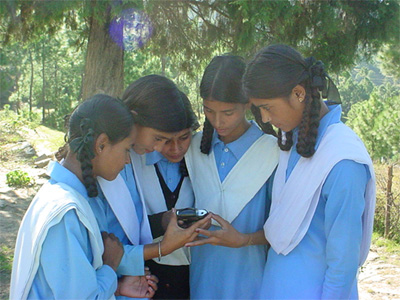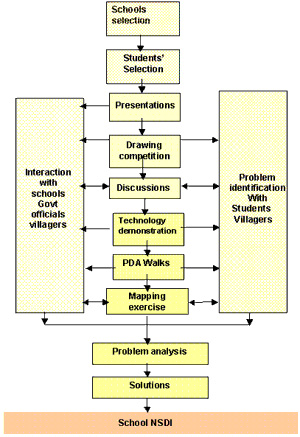Mapping the Neighbourhood- Capacity Building of Community to Use ICT for Education and Community Development

Research Objective
The objective of this research project was to explore the potential of ICTs in facilitating the communities’ creation of local level information repositories for local development. While the research involved studying the process through a live project involving the community and local government authorities in general, and school children in particular. The project titled ‘Mapping the Neighbourhood’ (supported by Department of Science and Technology, Government of India, and implemented by CSDMS, India) involved the community to generate geo-spatial data of their locality through the preparation of neighbourhood maps with the help of mobile mapping technique. The project involved introducing ICT to the community, capacity building of the community to use ICT for generation of local level information and engaging in the use of this information in local development planning. The research’s primary objective was to study the effect of using ICTs on community awareness building and learning.
The objectives of this initiative were:
- Identify and sensitise the community about local development issues
- Sensitise the community and local development bodies on the need and value of locally level information for local decision-making
- Capacity building of the community in the use of new technologies for generation of local information repositories
- Capacity building of the community to engage and participate in local governance
The research objective was to find out whether ICTs could be used as effective tools for community capacity building in the generation and use of locally relevant information for development.

Outcomes
The project created awareness among the school children about their locality and in the process established a clear program of education and awareness building for the community for them to realize the importance of community generated geospatial data.
Cooperative partnerships were created among communities and between the communities and development organisations for sharing of data that would enhance the understanding patterns of development that are significant to the larger area and help the community members in effective utilisation of the information for more informed decisions on local issues. The initiative was effective in evolving an unique local information base that can be substantially used for local level planning. It has emerged from the project that there is a need to bring Geo- ICT in community life. In most developing countries, collection of spatial as well as aspatial information is a challenge despite its effective role in problem solving. Geo-ICT can bring significant contribution to local development through participatory approach in data collection, dissemination and updating the data for generating local content of relevance for micro-level planning and development.
Another success outcome of the project has been to capacitate the community to prepare, use and update detailed neighbourhood maps, which are grounded in ecological and social narrative with school children as the spearhead of knowledge creation. Another important aspect of this project is local content generation for the community and by the community, taking the young, innovative minds as the central power to motivate the community for long-term learning with the help of ICT. Ultimately this local content will be of the community that can help them to actively participate in the decision making process.
This programme has helped the students to learn the art of scientific exploitation of maps and mapping techniques as an investigative tool to explore and archive information about natural resources, public utilities, infrastructure, demography and such similar study areas that have direct or indirect implication on them and their community. While they learn these diverse and fundamental issues and gain knowledge about them, they feel to be getting closer to their native land.
While the use of ICT for community learning, especially in the field of elementary education, eradicating illiteracy and training for youths has been popularised by various organisations, efforts towards “community-learning through knowledge creation” with the help of ICT, has been rare. At the age when technological innovations are changing the world with each passing day, technology is impacting human life like never before. It is crucial for the community to not only to be oriented towards these new age technologies but a knowledge about their application would prove effective for the community to explore its benefits for their own development.


